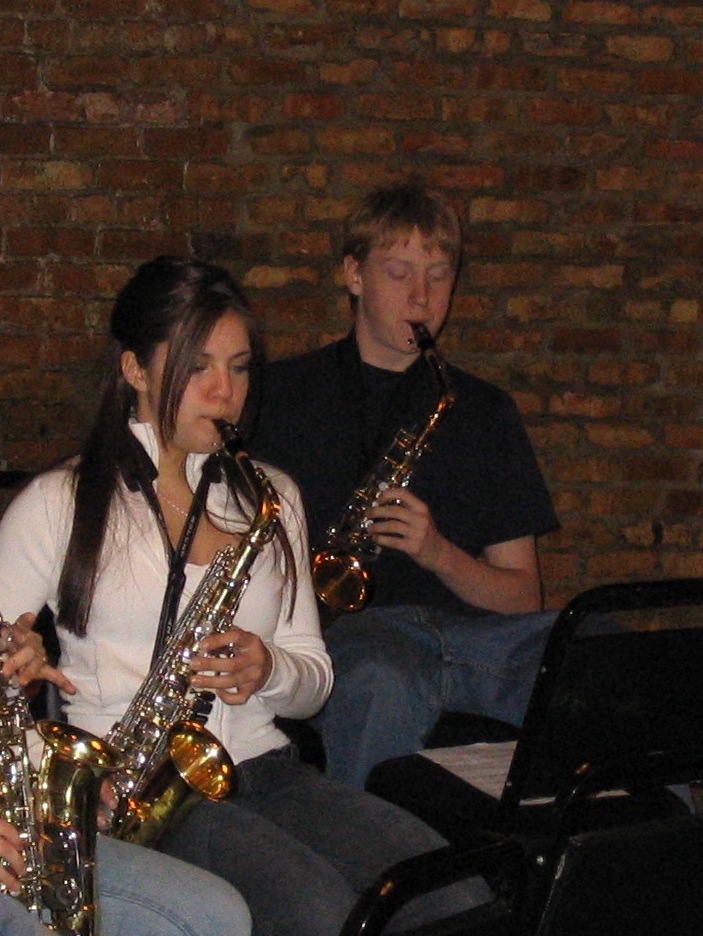Private Woodwind Lessons
The Woodwind Family of Instruments
The woodwind family includes the flute, oboe, bassoon, clarinet and saxophone. We currently offer flute, clarinet, and saxophone lessons. We also offer instruction on the recorder and the fife, which are appropriate preludes to the woodwind family for younger students and smaller hands.

The saxophone, flute and clarinet are popular instruments of choice for students in school programs, which have band or orchestral programs. Many of those programs only offer group lessons that don't give the student a chance to really excel and get past the beginner stage of learning. They also don't motivate them and help them foster a real love of the instrument. Students in those programs who really succeed are most often those who have found their way to private lessons.
Saxophone, flute and clarinet lessons all teach proper technique including development of breath support, correct embouchure and posture, and finger placement. Students will be taught basic theory as well as solo and ensemble pieces. All students will have the opportunity to perform in our recitals either as a soloist or in a group.
Saxophone & Clarinet
Our saxophone and clarinet students will learn core technique in breath support and the basics of good tone production. All students will learn basic scales, note reading, and improvisation. Students will also learn core and basic theory while learning all modern styles of jazz and classical.
Facts/Quotes
Did you know that the saxophone is a relatively young instrument? One hundred and sixty years to be exact. So that means that this is one of the few modern instruments which Beethoven had never played or even heard!
Brass and woodwinds are the prominent soloing instrument in jazz ensembles. Any classical ensemble that doesn't include any woodwinds is designated with the word ‘string' to denote the lack of woodwinds.
Famous closet woodwind players: Bill Clinton- saxophone, Woody Allen- clarinet
Frequently Asked Questions
When can my saxophone lessons begin?
ANYTIME
When can my flute lessons begin?
ANYTIME
When can clarinet lessons begin?
ANYTIME
How do I schedule my lessons?
We have teachers here throughout the week. Call us at 312-416-0622, email, or fill out our contact form in order to get the process started and to find out availability.
What age can I begin flute lessons?
This really depends on the size of the hands and length of the arms rather than the age of the student. Students ages 8 or 9 years old may provide a good baseline though. Students may begin as young as 5 or 6 years old using a recorder or fife as a precursory study to beginning flute lessons. There are also curved head joints that may be added to the flute making it more accessible to younger students.
What age can I begin saxophone lessons?
The more important question has to do with the physical size of the student and their hands and not necessarily their age. On average, 10 years old is a good age to begin lessons. Since the saxophone is a larger instrument made of metal, it takes some degree of physical strength just to be able to hold the instrument.
What age can I begin clarinet lessons?
The more important question has to do with the physical size of the student and their hands and not necessarily their age. On average, 9 or 10 years old is a good age to begin lessons.
Where can I rent or buy an instrument?
We recommending renting woodwind instruments or buying them used. If you buy them used, you should consider having someone who knows about that instrument to take a look to make sure it is in good condition. There are many places to rent from throughout the city. We recommend http://www.qandf.com/.
What styles of music will I be learning?
If you are a beginner, it will be mostly classical. As you progress you can learn jazz and other styles later if you like. We like to teach what our students are interested in, i.e., if you love blues and soul, just let us know and we will do our best to help you play your best.
Will there be opportunities to perform?
Yes! We have recitals quite frequently. Performances give students the opportunity to practice that final step of the music learning curriculum by exercising the presentation of their skills in a public forum.
How much should students practice?
It is very important to have daily practice so that the techniques learned in lessons are retained. Regularity is more valuable than duration, especially at the beginning of taking lessons. Practice time can range based on the level of the student from 15 minutes to 3 hours a day. Our teachers will work with students to come up with and recommend a practice schedule for students.
